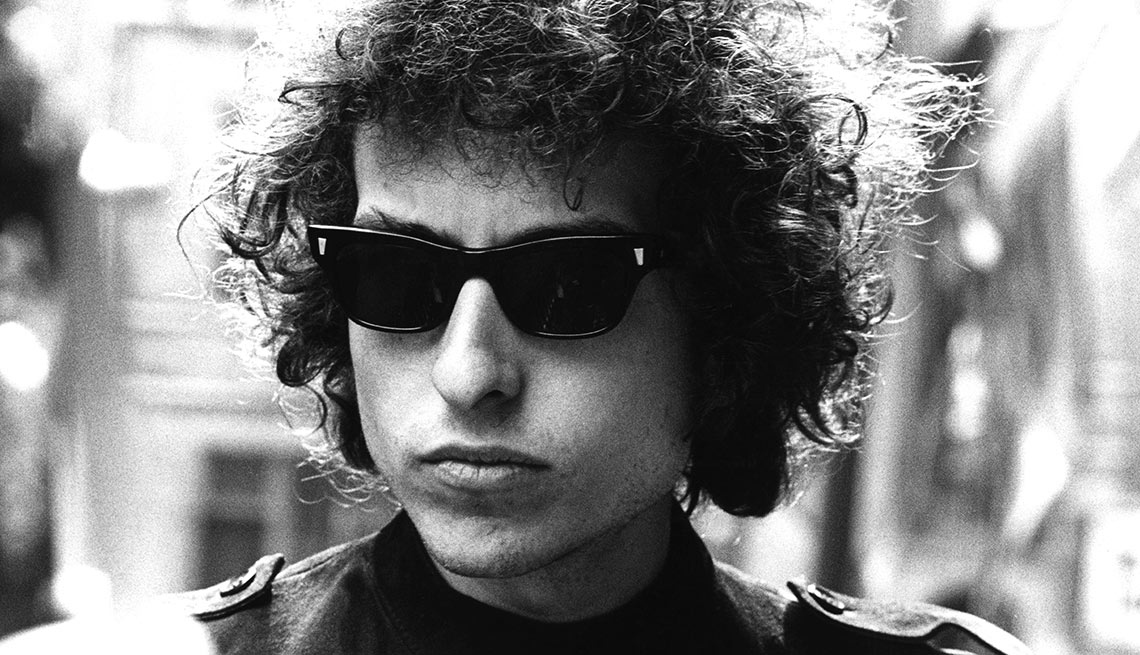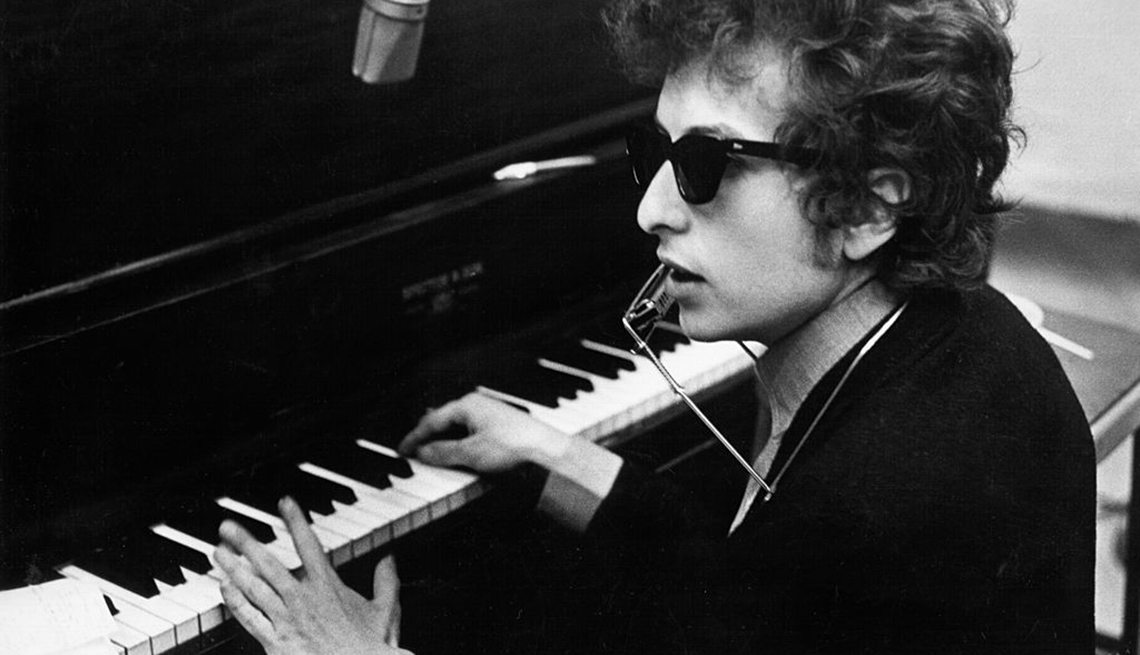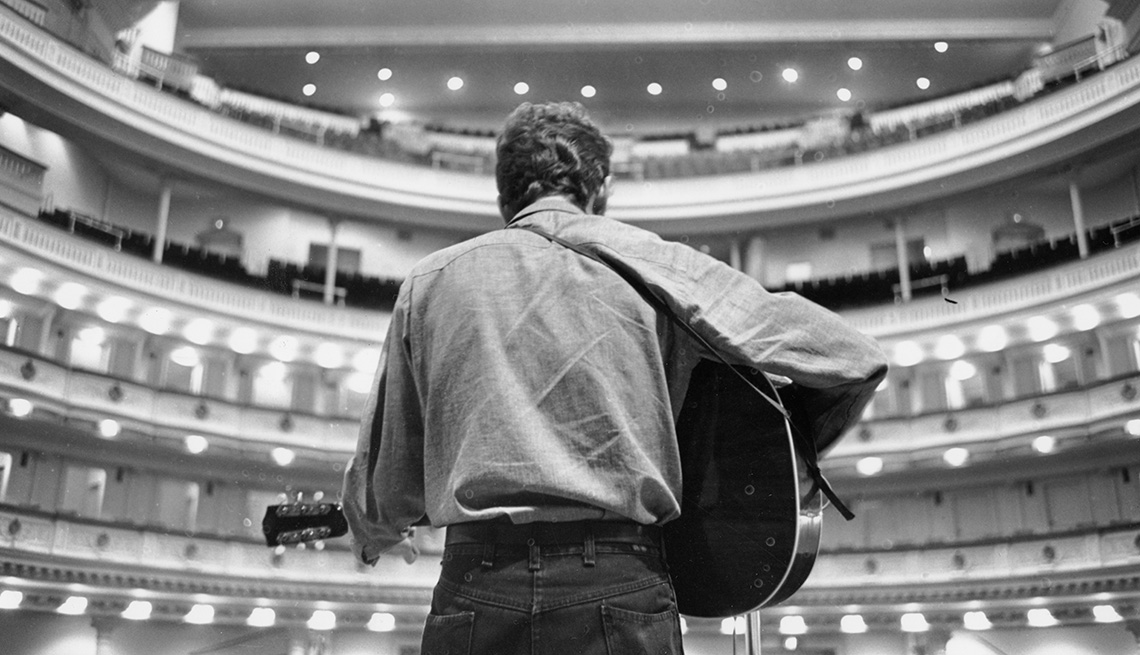"These songs [on my album] have been written by people who went out of fashion years ago. I’m probably someone who helped put them out of fashion. But what they did is a lost art form."
Q: Are the songs on this album laid down in the order you would like people to listen to them? Or do you care whether Apple sells them one by one?
A: The business end of the record — it’s none of my business. I sure hope it sells, and I would like people to listen to it. But the way people listen to music has changed, and I hope they get a chance to hear all the songs in one way or another. But! I did record those songs, believe it or not, in that same order that you hear them. Not that it matters, really. I didn’t pay any attention to the sequencing like on other records. We would usually get one song done in three hours. There’s no mixing. That’s just the way it sounded. No dials, nothing enhanced, nothing — that’s it. Capitol’s got those big echo chambers. So some of that was probably used. We used as little technology as possible. It’s been done wrong too many other times. I wanted to do it rightly.
Q: Was this recording an experiment?
A: It was more than an experiment. Because we had played these songs, we were dead sure that we could do them. It’s just a question of could it be recorded right. We did it the old-fashioned way, I guess you would say. That’s the way I used to make records anyway. I never did use earphones up until into the ’80s or ’90s. I don’t like to use earphones.
Q: You feel that’s a distancing thing?
A: Yeah. There’s a complete disconnect. You can overwhelm yourself in your own head. I’ve never heard anybody sing with those things in their ears effectively. They just give you a false sense of security. A lot of us don’t need earphones. I don’t think Springsteen does. I know Mick doesn’t. I don’t think he does. But other people you see, more or less have given in. They just do it. But they ought not to do it. They don’t need to. Especially if they have a good band.
Recording studios are filled with technology. They are set in their ways. And to update them means you’d have to change them back. That would be my idea of upgrading. And this will never happen. As far as I know, recording studios are booked all the time. So obviously people like all the improvements. The more technically advanced they are, the more in demand they become. The corporations have taken over. Even in the recording studio. Actually, the corporate companies have taken over American life most everywhere. Go coast to coast and you will see people all wearing the same clothes, thinking the same thoughts and eating the same food. Everything is processed.
Q: Let’s talk about the first song on the album, “I’m a Fool To Want You.” I’m interested in how you put across the heartbreak that’s on this record. It’s believed that Frank Sinatra wrote it for Ava Gardner, his great love. You wrote once that the performer, the artist transmits emotion via alchemy. “I’m not feeling this,” you’re saying. “What I’m doing is I’m putting it across.” Is that right?
A: You’re right, but you don’t want to overstate that. Look, it all has to do with technique. Every singer has three or four or five techniques, and you can force them together in different combinations. Some of the techniques you discard along the way, and pick up others. But you do need them. It’s just like anything. You have to know certain things about what you’re doing that other people don’t know. Singing has to do with techniques and how many you use at the same time. One alone doesn’t work. There’s no point to going over three. But you might interchange them whenever you feel like it. So yes, it’s a bit like alchemy. It’s different than being an actor where you call up sources from your own experience that you can apply to whatever Shakespeare drama you’re in or whatever television show. With a song it’s not quite the same way. An actor is pretending to be somebody, but a singer isn’t. He’s not hiding behind anything. And that’s the difference. Singers today have to sing songs where there’s very little emotion involved. That and the fact that they have to sing hit records from years gone by doesn’t leave a lot of room for any kind of intelligent creativity. In a way, having hits buries a singer in the past. A lot of singers hide in the past because its safer back there. If you’ve ever heard today’s country music, you’ll know what I’m talking about. Why do all these songs fall flat? I think technology has a lot to do with it. Technology is mechanical and contrary to the emotions that inform a person’s life. The country music field has especially been hit hard by this turn of events.
These songs [on my album] have been written by people who went out of fashion years ago. I’m probably someone who helped put them out of fashion. But what they did is a lost art form. Just like da Vinci and Renoir and van Gogh. Nobody paints like that anymore either. But it can’t be wrong to try.
So a song like “I’m a Fool to Want You” — I know that song. I can sing that song. I’ve felt every word in that song. I mean, I know that song. It’s like I wrote it. It’s easier for me to sing that song than it is to sing, “Won’t you come see me, Queen Jane.” At one time that wouldn’t have been so. But now it is. Because “Queen Jane” might be a little bit outdated. It can’t be outrun. But this song is not outdated. It has to do with human emotion, which is a constant thing. There’s nothing contrived in these songs. There’s not one false word in any of them. They’re eternal, lyrically and musically.
Q: Do you wish you wrote them?
A: In a way I’m glad I didn’t write any of them. I’m good with songs that I haven’t written, if I like them. I already know how the song goes, so I have more freedom with it. I understand these songs. I’ve known them for 40 years, 50 years, maybe longer, and they make a lot of sense. So I’m not coming to them like a stranger. I’ve written all the songs that I feel are ... I don’t know how to put this ... You travel the world, you go see different things. I like to see Shakespeare plays, so I’ll go — I mean, even if it’s in a different language. I don’t care, I just like Shakespeare, you know. I’ve seen Othello and Hamlet and Merchant of Venice over the years, and some versions are better than others. Way better. It’s like hearing a bad version of a song. But then somewhere else somebody has a great version.
Q: I like your version of “Lucky Old Sun.” Can you talk about what drew you to this one in particular? Did you have a memory of it?
A: Oh, I’ve never not known that song. I don’t think anybody my age can tell you that they ever remember not knowing that song. I mean, it’s been recorded hundreds of times. I’ve sung it in concert.
Q: Have you?
A: Yeah. But I never really got to the heart of the song until recently.
Q: So how do you do that?
A: Well, you cut the song down to the bone and see if it’s really there for you to do. Most songs have bridges in them. A bridge is something that distracts a listener from the main verses of a song so the listener doesn’t get repetitively bored. My songs don’t have a lot of bridges because lyric poetry never had them. But when a song like “Autumn Leaves” presents itself, you have to decide what’s real about it and what’s not. Listen to how Eric Clapton does it. He sings the song, and then he plays the guitar for 10 minutes and then he sings the song again. He might even play the guitar again, I can’t remember. But when you listen to his version, where do you think the importance is? Well obviously, it’s in the guitar playing. He sings the song twice both the same way. And there’s really no reason to do that unless you’re singing the song in a different way. It’s OK for Eric because he’s a master guitar player and, of course, that’s what he wants to feature on any song he records. But other people couldn’t do it and get away with it. It’s not exactly getting to the heart of what “Autumn Leaves” is about. And as a performer, you don’t get many chances to do that. And when you get the opportunity, you don’t want to blow it. With all these songs you have to study the lyrics. You have to look at every one of these songs and be able to identify with them in a meaningful way. You can hardly sing these songs unless you’re in them. If you want to fake it, go ahead. Fake it if you want. But I’m not that kind of singer.
Q: Can we talk about some of the melodies of these songs?
A: Yeah, they’re incredible, aren’t they? All these songs have classical music under-themes. Why? Because all these composers learned from classical music. They were composers who understood music theory, and they went to music academies. It could be a little piece of Mozart, Bach — Paul Simon did an entire song using a Bach melody — or it could be a piece of Beethoven or Liszt, Chopin, Rachmaninoff, or Stravinsky or Tchaikovsky. You can get a lot of great melodies listening to Tchaikovsky if you’re a commercial songwriter or composer, and these guys did that. Not that I myself recognize where these melodies and parts came from, but I know they came from somewhere in that direction. Most of these songs are written by two people, one for the music and one for the words.
There’s only one guy that I know of who did it all, and that was Irving Berlin. He wrote the melody and the lyrics. This guy was a flat-out genius. I mean, he had a gift, like, it just wouldn’t stop giving, classical themes not withstanding, because I don’t think he used any. But everyone else who wrote lyrics had to depend on a piece of music. Lyricists themselves, they were a funny breed. They are not who you would think they would be. They came from all walks of life. Highbrow, lowbrow. Could be a telephone repairman, a typesetter, insurance salesman. One was a house painter, another a car mechanic. Jimmy Van Heusen was a stunt pilot. All these people knew how to keep it simple and understood ordinary daily existence, common life. And they did good.
Q: Who could speak the vernacular.
A: Who spoke the vernacular. Exactly. So there’s nothing contrived about these songs. There’s not one false word in any of them.
Q: Do you like Johnny Mercer?
A: I love Johnny Mercer. Yeah. I love ...
Q: He did the English lyrics for “Autumn Leaves.”
A: Yeah, he did. Well it doesn’t surprise me. I love all of his stuff — one of the most gifted lyricists. Yeah. “Jeepers Creepers.” “Lazy Bones.” “Blues in the Night.” We do a lot of his songs at sound checks. If he was around now, I’d like to give him some of my instrumental tapes. See what he could do with them. But they might be beneath him.
Q: Your renditions and these arrangements are very respectful. The arrangements are almost austere, but your renditions are very respectful of these melodies — more than you are of your own songs when you perform.
A: Well, I love these songs, and I’m not going to bring any disrespect to them or treat them irreverently. To trash those songs would be sacrilegious. We’ve all heard those songs being trashed, and we’re used to it. They go by without even being heard. In some kind of ways you want to right the wrong, maybe unconsciously. But I’m not on a crusade. I think if others want to pick it up, they can and should. But if not, that’s OK, too. I don’t think of these songs as covers. I think of them as songs that have all been done before in many ways. The word “covers” has crept into the musical vernacular. Nobody would have understood it in the ’50s or ’60s. It’s kind of a belittling term. What does it mean when you cover something up? You hide it. I’ve never understood that term. Am I doing a bunch of covers? Well, yeah, if you say so.
Q: So you’re really uncovering.
A: Exactly. That’s a good point.
More Dylan
The story of Bob Dylan in 20 songs. Check out these classic tunes.
What year did the Bard legally change his name from Robert Zimmerman to Bob Dylan? Get the answer to this and more Dylan trivia questions in our Ultimate Fan Quiz
Music critic Bill Flanagan gives us a crash course on Dylan. From his years at the Newport Folk Festival to his Medal of Honor from President Obama, it's all here in our Bob Dylan Primer



